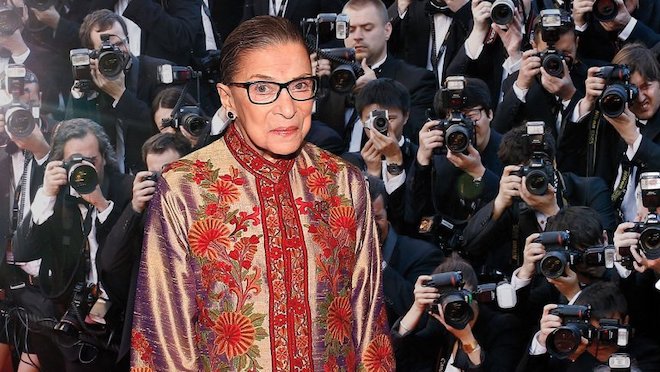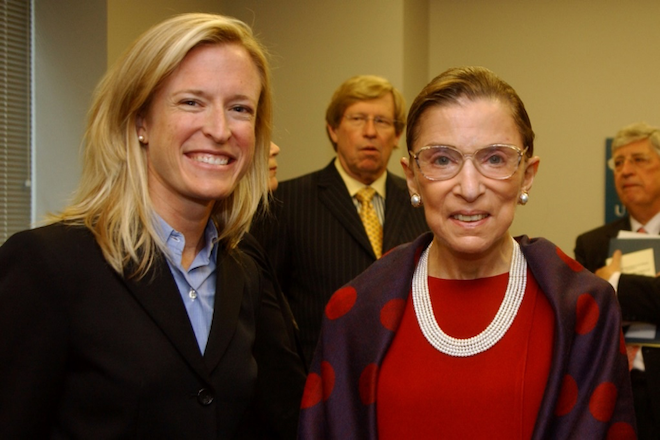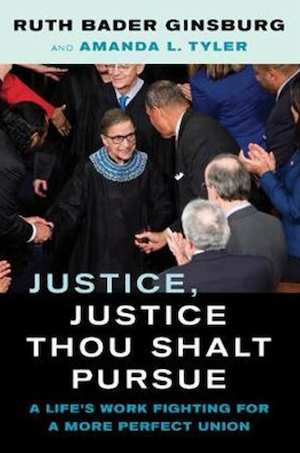RBG reincarnated
 Book review •
Book review •  Friday, May 14, 2021
Friday, May 14, 2021 Insights into the life and work of Ruth Bader Ginsberg ... Towards a More Perfect Union ... The great sex discrimination abolitionist ... A supreme intellect at work ... Braham Dabscheck reviews a collection of RGB's speeches and key cases ... Justice, Justice, Thou Shalt Pursue

Ruth Bader Ginsburg was a justice of the Supreme Court of America from 1993 until her death in September 2020.
In October 2019, the University of California’s Berkeley School of Law asked Justice Ginsburg to deliver the inaugural Herma Hill Kay Memorial lecture to honour her pioneering role as a female legal academic. Amanda Tyler, a professor at the School who clerked for Ginsburg in 1999-2000, organised the lecture.
They decided to publish a book containing the lecture, a conversation between the two, and some of Ginsburg’s major briefs, decisions and miscellaneous speeches. The title, Justice, Justice, Thou Shalt Pursue is a quote from Deuteronomy, and was inscribed on a plaque that hung on a wall in her chambers.
Ginsburg initially came to attention in the 1970s with a series of cases that put an end to legal sex discrimination. The most famous was Reed v Reed (1971), which found an Idaho law that gave preference to a man over a woman in probate cases (the dispersal of assets after someone’s death) breached the principle of "equal protection" contained in the American Constitution.
The book’s subtitle refers to the preamble to the American Constitution, which says: "We the People of the United States, in Order to form a more perfect Union ..."
Ginsburg saw her role, and that of the Court, as being to give effect to this quest to perfect the Union; sex discrimination was her starting point.
Ginsburg was born in March 1933 in Brooklyn, New York. Aged 13 she referred to the importance of the Magna Carta, the English Bill of Rights, the Declaration of Independence and the United Nations Charter in the school newspaper.
She gave no thought to a career in the law "because women were not there". This changed when she saw the important role that lawyers played using the free speech provisions of the First Amendment in response to the McCarthyism of the early 1950s. Ginsburg saw how the First Amendment guaranteed "the right to think, speak, and write as we believe and not as big brother government tells us is the right way to think, speak and write".
After graduating in law as equal top of her year, Ginsburg found it difficult to land a job with a law firm, due to being a woman, and instead found her way into academe. In 1980 she was appointed to the United States Court of Appeals, and in 1993 to the Supreme Court.
 Amanda Tyler with Ruth Bader Ginsburg
Amanda Tyler with Ruth Bader Ginsburg
As both an advocate and a judge, Ginsburg employed what is known as a sociological approach to the law. She was not just concerned with the previous decisions of courts, but also obtained information on what was happening "on the ground" in the real world by assiduously reading government reports, the work of scholars and the testimony of experts.
Justice provides three examples of Ginsburg’s work as an advocate. The first is a brief she prepared with her husband Marty, a tax lawyer (‘the first boy I ever dated who cared I had a brain’). Moritz v Commissioner of Internal Revenue (1971) involved denial of a tax concession for a never-married son who was caring for his aged mother. Such a concession was available for never-married single women. They argued such a distinction made no sense.
The other two were oral submissions to the Court, usually of eleven to twelve minutes. Frontiero v Richardson (1973) involved differences in benefits afforded to the spouses of male and female members of the armed services. Benefits were available to wives of servicemen, but not to husbands of servicewomen.
Ginsburg maintained that "sex, like race, is a visible, immutable characteristic bearing no necessary relationship to ability’" She finished her submission with the "attention-grabbing" 1837 quote from the abolitionist and feminist Sarah Grimke:
"I ask no favor for my sex. All I ask our brethren is that they take their feet off our necks."
Weinberger v Wiesenfeld (1975) concerned the payment of social security benefits following the death of a spouse. Payments were higher for the wife if a man died, lower for a male if the wife died. Weinberger’s wife died in childbirth. He decided to stay at home to look after his son and was denied benefits his wife would have received if he had died.
The legislation rested on the primacy of the male as breadwinner. Ginsburg argued that this case illustrated "the critical importance of judicial assessment of law-reinforced sex role pigeon-holing defended as a remedy".
Four examples of Ginsburg’s decisions as a member of the court are included. The state of Virginia and the Virginia Military Institute denied entry to females on the basis that women were unsuited to the rigorous demands of such training, which would "destroy ... any sense of decency that still permeates the relationship between the sexes".
In Virginia v United States (1996) Ginsburg systematically demolished these suppositions. While the demands of the Institute may be too onerous for most women (and men, for that matter), there are women who are capable of meeting the requirements of entry.
In discussing this decision, Ginsberg examines how, over the years, various professions - law, medicine, the police, the armed forces – have mounted such arguments and how, after a short period of adjustment, women were found to be as capable as men.
She even draws out a quote from Plato, who had no objections to women being guardians in Ancient Greece; the guardians’ training involved wrestling naked, but the philosopher concluded "their virtue would clothe the women’s nakedness".
Ledbetter v Goodyear Tire and Rubber (2007) involved the majority of the court disallowing an equal pay claim by Lily Ledbetter, who had been paid less than men performing the same work over a 20-year period. She was caught out by a requirement that notification of such underpayment be provided within 180 days of it occurring. Ginsburg took issue with how the majority interpreted this clause and recommended Congress pass legislation to overcome the problem, which it did.
Shelby County v Holder (2013) involved the majority taking an axe to the Voting Rights Act of 1965, which sought to ensure that African Americans and other minorities did not have their voting rights voided by the actions of state legislatures and officials.
Ginsburg’s dissent provides an exhaustive account of the sorry history of racial discrimination in America and the various ways states seek to perpetuate white dominance. She observed that abolishing mechanisms that stopped such discrimination "is like throwing away your umbrella in a rainstorm because you are not getting wet".
Burwell v Hobby Lobby Stores (2014) involved the Affordable Care Act, or what is known as Obamacare. Most Americans have their health insurance covered by their employers. Under the Act, religious organisations could avoid the requirement to provide payments for contraceptives if they had a religious objection to contraception.
This case involved a for-profit organisation seeking to opt out of the same obligation if it had a similar religious conviction. The majority of the court granted this request.
 Ginsburg had two major objections. First, while the members of a religious organisation may share the same beliefs, this does not apply to a for-profit organisation. Its workforce is not drawn from one religious community, and the law forbids such discrimination. Second, where is one to draw the line on religious beliefs trumping national legislation? Can it be extended to anything, and how is a court to know if such beliefs are seriously held or simply a ruse to escape legislative obligations?
Ginsburg had two major objections. First, while the members of a religious organisation may share the same beliefs, this does not apply to a for-profit organisation. Its workforce is not drawn from one religious community, and the law forbids such discrimination. Second, where is one to draw the line on religious beliefs trumping national legislation? Can it be extended to anything, and how is a court to know if such beliefs are seriously held or simply a ruse to escape legislative obligations?
The thing that stands out in reading Justice, Justice Thou Shalt Pursue is the clarity of Ginsburg’s thought, the way she systematically dissects and examines complex issues. She is a superb wordsmith, not one for wasting words. Some of her best work is contained in killer footnotes where she dismisses, with a hand seemingly flicking away a fly, contentions she finds wanting.
The book is highly recommended for those with or without a legal background. I cannot remember when I have been more impressed - exhilarated may be a better word - in beholding the work of a supreme intellect. When the history of the Supreme Court is finally written, Ruth Bader Ginsburg will be afforded a special place in the pantheon of American jurists.
Amanda Tyler should be congratulated for the way in which she has organised and provided overviews of the material. Her Afterword, written following Justice Ginsberg’s death, conveys the high regard in which she was held by those in her orbit and makes for moving reading.
Ginsburg had a certain way of using language, of using understatement to hammer home a point. Two examples will suffice. The first is from a speech on increasing opportunities for women. She said she had been "heartened by the words of a girl of my generation", and produced a quote from the girl concerned: it was Anne Frank.
The second is a statement contained in Shelby County v Holder. She wrote of a "great man who led the march from Selma to Montgomery" who told us "The arc of the moral universe is long ... [but] it bends toward justice". The "great man" was Martin Luther King, and this arc shaped the life of Ruth Bader Ginsberg.
Ruth Bader Ginsburg and Amanda L. Tyler Justice, Justice Thou Shalt Pursue: A life’s work fighting for a more perfect Union University of California Press 2021 HB 288pp $32.95
Braham Dabscheck is a Senior Fellow at the Melbourne Law School at Melbourne University who writes on industrial relations, sport and other things. He recently completed a review article on the Supreme Court of the United States and a domestic transfer system in Australian soccer.
This review originally appeared in the Newtown Review of Books










Reader Comments